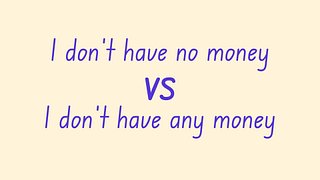Overview:
Double negatives occur when two negative words are used in the same sentence. In English, using double negatives can create confusion because they often cancel each other out, making the sentence positive. It is important to use only one negative word in a sentence to express a negative meaning clearly.
Common Negative Words:
Verbs/Contractions: isn't, aren't, wasn't, weren't, doesn't, don't, didn't, hasn't, haven't, hadn't, couldn't, wouldn't, shouldn't, won't, can't, mustn't, no (as in "no one")
Adverbs: never, hardly, scarcely, barely, rarely
Pronouns: nobody, no one, nothing, none
Determiners: no
Incorrect Examples (Double Negatives):
"I don't have no money." (Incorrect: "don't" and "no" are both negative)
"She didn't say nothing." (Incorrect: "didn't" and "nothing" are both negative)
"He can't hardly hear you." (Incorrect: "can't" and "hardly" are both negative; "hardly" implies a negative)
"They won't never agree." (Incorrect: "won't" and "never" are both negative)
"There isn't nobody home." (Incorrect: "isn't" and "nobody" are both negative)
Correct Examples (Single Negative):
To correct a double negative, choose one of the following approaches:
Use a single negative word:
"I don't have any money." (Correct: "any" is not negative)
"I have no money." (Correct: "no" is the single negative)
"She didn't say anything." (Correct: "anything" is not negative)
"She said nothing." (Correct: "nothing" is the single negative)
"He can hardly hear you." (Correct: "can" is positive, letting "hardly" carry the negative meaning)
"They will never agree." (Correct: "will" is positive, letting "never" carry the negative meaning)
"There isn't anyone home." (Correct: "anyone" is not negative)
"There is nobody home." (Correct: "nobody" is the single negative)
Exceptions or Things to Pay Attention To:
In some dialects of English, double negatives are used for emphasis and are understood as negative. For example, "I ain't done nothing" means "I haven't done anything" in some informal speech. However, this is not standard English and should be avoided in formal writing.

